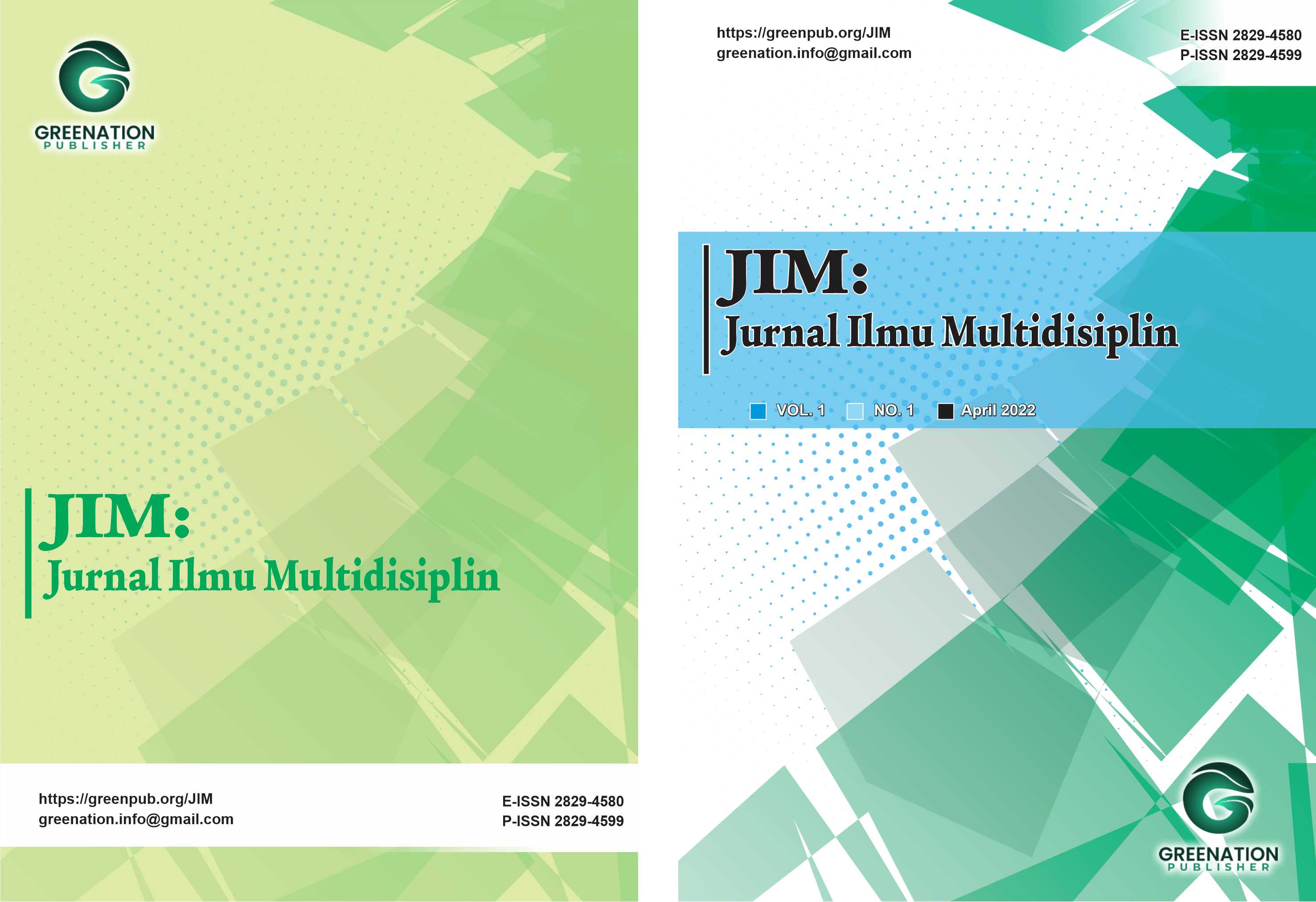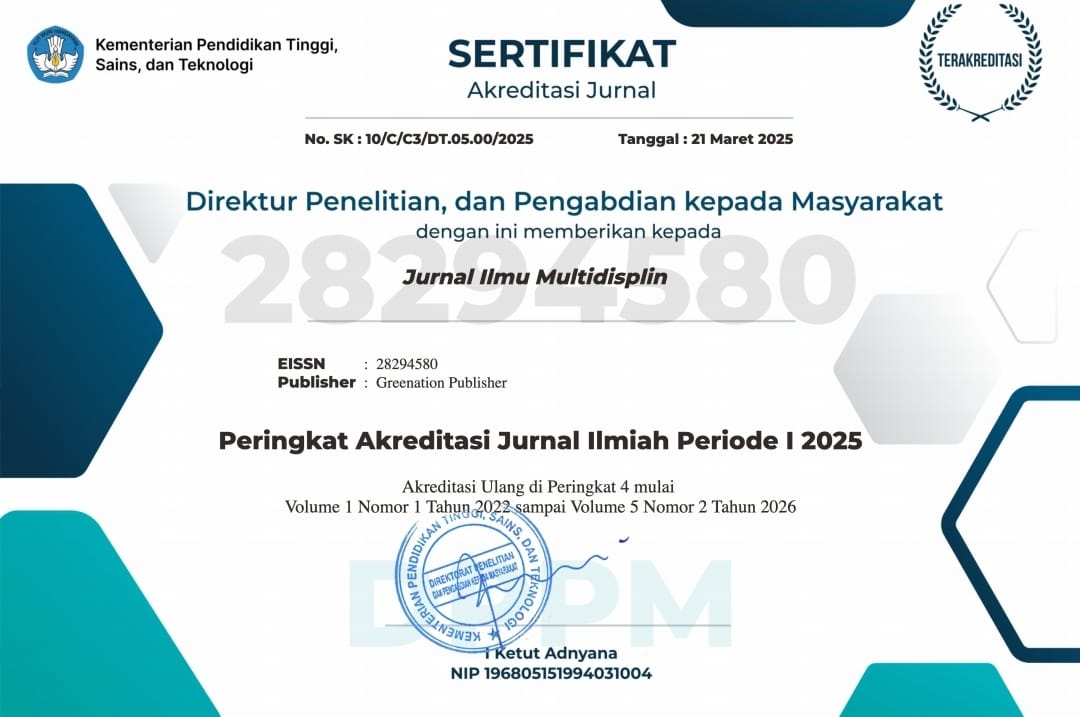Kerja Sama Multilateral dalam Mengurangi Polusi Plastik: Tantangan dan Potensi Global Plastics Treaty di Kawasan ASEAN
DOI:
https://doi.org/10.38035/jim.v4i3.1192Keywords:
ASEAN, Global Plastics Treaty, Kerja Sama MultilateralAbstract
Permasalahan polusi plastik telah menjadi polemik lingkungan global yang mendesak dengan negara-negara di Asia Tenggara berkontribusi signifikan sebagai penyumbang utama sampah plastik laut dengan enam negara di kawasan ini termasuk dalam daftar penghasil sampah plastik terbesar dunia. Kompleksitas permasalahan ini diperparah oleh belum adanya perjanjian global yang mengikat secara hukum untuk menangani polusi plastik secara menyeluruh. Penelitian ini bertujuan untuk mengkaji tantangan dan potensi kerja sama multilateral melalui Global Plastics Treaty dalam upaya mengurangi polusi plastik di kawasan. Penelitian dilakukan dengan pendekatan kualitatif dan menggunakan data sekunder. Hasil penelitian menunjukkan bahwa perjanjian ini memiliki potensi besar sebagai perjanjian global yang komprehensif dan mengikat secara hukum, dapat mendorong kolaborasi antarnegara di kawasan dalam pengelolaan limbah plastik, dan pengendalian perdagangan sampah lintas batas. Namun, perbedaan kapasitas nasional, pengaruh industri, dan lemahnya komitmen politik menjadi hambatan utama. Penelitian ini menyimpulkan bahwa keberhasilan perjanjian ini sangat bergantung pada komitmen kolektif negara-negara di kawasan, penguatan mekanisme multilateral, serta keterlibatan aktif aktor nonnegara dalam proses negosiasi dan implementasi untuk mendukung pengurangan polusi plastik.
References
Akrofi, D. F., Shang, P., & Ciesielczuk, J. (2022). Reconsidering: Approaches towards Facilitating Non-State Actors' Participation in the Global Plastics Regime. Eur. J. Legal Stud., 14, 121.
Asante-Duah, K., & I.V.N. (1998). Introduction. In International Trade in Hazardous Waste (1st ed., pp. 1-6). London and New Yowrk: Routledge.
Asian Development Bank. (2023). Plastic pollution and its climate benefits.
Asokan, V.A., A. Abeynayaka, and Y. Hotta (2023), Building Data on the Plastics Value Chain in ASEAN Member States. Jakarta: Economic Research Institute for ASEAN and East Asia (ERIA).
Bäckstrand, K. (2006). Multi?stakeholder partnerships for sustainable development: rethinking legitimacy, accountability and effectiveness. European Environment, 16(5), 290–306. https://doi.org/10.1002/eet.425
Brooks, A. L., Wang, S., & Jambeck, J. R. (2018). The Chinese import ban and its impact on global plastic waste trade. Science Advances, 4(6), eaat0131. https://doi.org/10.1126/sciadv.aat0131
Carruthers, M. (2024, February 29). Why Southeast Asia’s growing waste problem presents huge opportunity for climate tech start-ups. Eco-Business.
Center for International Environmental Law. (2023, November 15). Fossil fuel and chemical industries at INC-3.
Dudayev, R. (2024, November 27). From COP16 to INC-5: Will ASEAN champion the fight against plastic pollution? Eco-Business.
Ellen MacArthur Foundation. (2024, October 28). Global CEOs call for a legally binding global plastics treaty.
Environmental Justice Foundation. (2024, April 18). CSOs call for ASEAN leadership for a successful Global Plastics Treaty to end plastic pollution.
Eom, T. Y., & Hong, W. (2024, December 18). In South Korea, global plastics treaty hits dead end. Asia Pacific Foundation of Canada.
GAIA Asia Pacific. (2024). ASEAN leadership key to the success of global plastic treaty to end plastic pollution [Policy brief]. https://www.no-burn.org/wp-content/uploads/2024/04/IDN-ASEAN-leadership-key-to-the-success-of-global-plastic-treaty-to-end-plastic-pollution.pdf
Global Plastic Laws. (n.d.). UN Global Plastics Treaty. https://www.globalplasticlaws.org/un-global-plastics-treaty
Greenpeace Malaysia. (2024, April 18). ASEAN leadership key to the success of global plastic treaty to end plastic pollution. Greenpeace Malaysia.
Guzman, R. J., & Baker, J. (2024, January). Addressing plastic pollution for climate benefits: Opportunities in the Global Plastics Treaty for Asia and the Pacific (ADB Briefs No. 284). Asian Development Bank. https://www.adb.org/
Hinz, E. (2024, April 18). Bagaimana sampah ilegal Eropa bisa berakhir ke ASEAN. DW.com.
Kaza, S., Yao, L., Bhada-Tata, P., & Van Woerden, F. (2018). What a Waste 2.0: A Global Snapshot of Solid Waste Management to 2050. World Bank.
Kean-Hammerson, J., & Collet, R. (2024, November). Finalising the Global Plastics Treaty: Key Issues and Steps Towards Effective Implementation (Policy brief). Europe Jacques Delors. https://www.jacquesdelorsinstitute.eu/
Kölsch, F. (2000). Stability problems of landfills – The Payatas landslide. Asian Development Bank.
Maes, T., Wienrich, N., Weiand, L., & Cowan, E. (2023). A little less conversation: How existing governance can strengthen the future global plastics treaty. Cambridge Prisms: Plastics, 1, e22. https://doi.org/10.1017/plc.2023.22
Meijer, L. J. J., van Emmerik, T., van der Ent, R., Schmidt, C., & Lebreton, L. (2021). More than 1000 rivers account for 80% of global riverine plastic emissions into the ocean. Science advances, 7(18), eaaz5803. https://doi.org/10.1126/sciadv.aaz5803
Ismawati, Y., & Yi, P. W. (2025, April 4). ASEAN’s position in plastic treaty negotiations: Paper tiger, plastic dragon? The Diplomat.
Ministry of the Environment Japan. (2022). Summary of import regulation of plastic waste in Asian countries.
Mosbergen, D. (2019, March 8), Why Southeast Asia Is Flooded with Trash from America and Other Wealthy Nations.
Ralston, R., & Taggart, J. (2025). Plastic partnerships: How corporations are hedging against the UN Global Plastics Treaty. Global Environmental Politics, 25(1), 77–88. https://doi.org/10.1162/glep_a_00772
Ralston, R., Carney Almroth, B., Radvany, R., Shah, D., Wang, M., & Lee, J. (2025). Preventing corporate capture: Democratic legitimacy and the global plastics treaty. One Earth, 8(5), 101315. https://doi.org/10.1016/j.oneear.2025.101315
Ruggie, J. G. (1992). Multilateralism: the anatomy of an institution. International Organization, 46(3), 561–598. https://doi.org/10.1017/S0020818300027831
Soudachanh, S., Campitelli, A., & Salhofer, S. (2024). Identifying Priorities for the Development of Waste Management Systems in ASEAN Cities. Waste, 2(1), 102-121. https://doi.org/10.3390/waste2010006
Suradja, I., & Suwarno, A. S. (2024, November). Regional knowledge sharing for addressing plastic pollution (Policy Brief No. 2024-08). Economic Research Institute for ASEAN and East Asia (ERIA).
Suradja, I., Suwarno, A. S., Kawamura, R., & Kojima, M. (n.d.). Recommendations: ASEAN Conference on Combating Plastic Pollution – Enhanced synergies and collaborative actions to combat plastic pollution, including in the marine environment. Economic Research Institute for ASEAN and East Asia (ERIA) & Regional Knowledge Centre for Marine Plastic Debris.
Tan, J., & Ho, Y. (2023). Civil society, environmental justice, and plastics governance in Southeast Asia. Journal of Environmental Policy and Planning, 25(2), 187–205.
UNEP. (2019). Plastic Waste Management in ASEAN: Issues, Challenges and Opportunities. United Nations Environment Programme.
United Nations Environment Programme (2021). Making Peace with Nature: A scientific blueprint to tackle the climate, biodiversity and pollution emergencies. Nairobi.
United Nations Environment Programme. (2019). Solving plastic pollution through accountability. Nairobi: UNEP.
United Nations Environment Programme. (2021). Global environment outlook – GEO-6: Healthy planet, healthy people.
United Nations Environment Programme. (2022). UNEA resolution 5/14: End plastic pollution: Towards an international legally binding instrument.
United Nations Environment Programme. (2024). Report of the intergovernmental negotiating committee to develop an international legally binding instrument on plastic pollution, including in the marine environment, on the work of its fourth session (UNEP/PP/INC.4/5).
United Nations Environment Programme. (2025). Draft report of the intergovernmental negotiating committee to develop an international legally binding instrument on plastic pollution, including in the marine environment, on the work of the first part of its fifth session (UNEP/PP/INC.5/8).
United Nations Office on Drugs and Crime. (2024). Cash in the trash: The role of corruption, organized crime and money laundering in waste trafficking. UNODC.
World Bank Group. (2021). Plastic Waste Discharges from Rivers and Coastlines in Indonesia.
World Economic Forum. (2023, October 10). How to defeat the plastic tide threatening ASEAN’s green growth.
World Economic Forum. (2023). Tackling Southeast Asia’s plastic crisis.
World Wildlife Fund. (n.d.). Global plastics treaty.
Zhang, T. (2020). Landfill Earth: A Global Perspective on the waste problem.
Downloads
Published
How to Cite
Issue
Section
License
Copyright (c) 2025 Alya Rachma Diva, Siti Aliyuna Pratisti

This work is licensed under a Creative Commons Attribution 4.0 International License.
You are free to:
- Share— copy and redistribute the material in any medium or format
- Adapt— remix, transform, and build upon the material for any purpose, even commercially.
The licensor cannot revoke these freedoms as long as you follow the license terms.
Under the following terms:
- Attribution— You must give appropriate credit, provide a link to the license, and indicate if changes were made. You may do so in any reasonable manner, but not in any way that suggests the licensor endorses you or your use.
- No additional restrictions— You may not apply legal terms or technological measures that legally restrict others from doing anything the license permits.
Notices:
- You do not have to comply with the license for elements of the material in the public domain or where your use is permitted by an applicable exception or limitation.
- No warranties are given. The license may not give you all of the permissions necessary for your intended use. For example, other rights such as publicity, privacy, or moral rightsmay limit how you use the material.



























